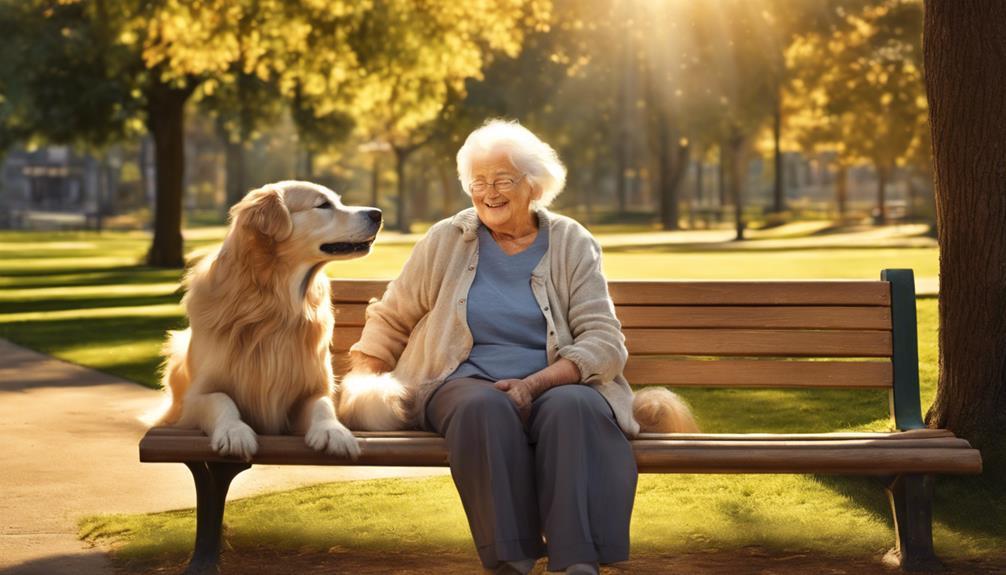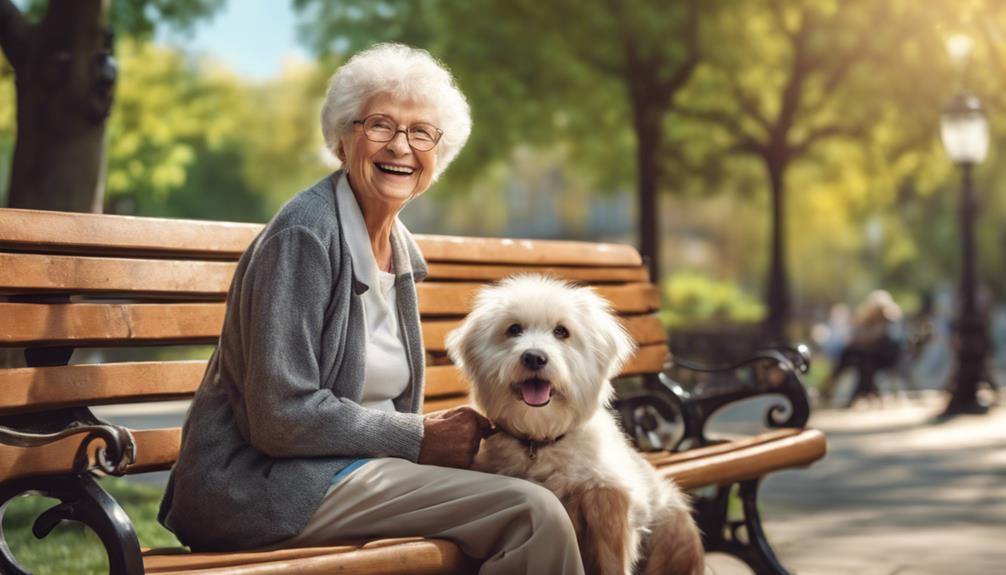Pets can bring happiness and improve health for seniors. They can help with cardiovascular health, lower blood pressure, and promote physical activities like walking. Pets also offer emotional support, improve mental well-being, and decrease loneliness. Having a pet can enhance cardiovascular health, mobility, and reduce stress. Living with pets can lower cortisol levels, decrease anxiety, and encourage relaxation. In general, pets increase happiness, decrease depression, and provide a sense of purpose. Their companionship is a valuable asset for seniors.
Key Takeaways
- Pets enhance seniors' cardiovascular health and mental well-being.
- Companionship from pets reduces loneliness and provides emotional support.
- Owning pets encourages physical activity, improving overall health.
- Pets reduce stress, anxiety, and feelings of isolation in seniors.
- Senior pet ownership boosts happiness, offering a sense of purpose and routine.
Senior Health Benefits of Pet Companionship
Owning a pet greatly enhances the health and well-being of seniors. Pets play a crucial role in improving cardiovascular health among seniors. Studies show that having a furry companion can lead to lower blood pressure levels and reduced risk of heart-related issues. The presence of pets also encourages seniors to engage in physical activities like walking or playing, which further contributes to their overall well-being.
In addition to physical health benefits, pets provide emotional support to seniors. The human-animal bond formed between seniors and their pets is incredibly strong and can boost mental well-being. Interacting with pets releases feel-good hormones called endorphins, elevating mood and reducing feelings of loneliness. This companionship gives seniors a sense of purpose and a constant source of joy in their lives.
Emotional Well-being Through Pet Relationships

Pets play an essential role in enhancing seniors' emotional well-being through the bonds and relationships they form, reducing feelings of loneliness and isolation while providing companionship and support. The profound impact of the unconditional love and companionship provided by pets can greatly influence the happiness and overall emotional health of seniors in senior living communities.
Daily interactions with pets create a sense of purpose and responsibility, giving seniors a reason to look forward to each day. The emotional support and connection seniors receive from their animal companions can help combat social isolation, fostering a sense of belonging and emotional fulfillment. Seniors who've pets often report higher levels of contentment and joy in their lives, attributing much of it to the close bond they share with their furry friends.
Physical Activity and Senior Pet Ownership
Engaging in regular physical activity with their pets, senior individuals experience improved cardiovascular health and overall physical well-being. Walking a dog or playing with pets not only helps seniors stay active but also enhances their heart health and mobility. This interaction with pets can lead to lower blood pressure and reduced stress levels, ultimately benefiting their physical health. Owning pets encourages daily movement, such as grooming cats or cleaning bird cages, which contributes to better overall health outcomes for seniors.
—
| Benefits of Physical Activity for Seniors and Their Pets | |
|---|---|
| Improves Cardiovascular Health | Enhances Mobility |
| Lowers Blood Pressure | Reduces Stress Levels |
| Promotes Heart Health | Maintains Overall Physical Well-being |
Combatting Loneliness With Pet Companions

Interacting with pets not only improves physical health but also plays a substantial role in combating loneliness among seniors. Seniors who've pets often experience reduced feelings of loneliness and isolation. The companionship and emotional support provided by pets can help combat social isolation and contribute to overall well-being. Owning a pet offers seniors unconditional love and a sense of purpose, which can enhance their mental health and boost happiness levels. In recent years, **care robots for elderly support** have also emerged as an innovative solution to help seniors maintain companionship and combat isolation. While these robots might not replace the emotional connection found with pets, they can offer seniors additional assistance and engagement, thereby complementing the benefits provided by pet ownership. Integrating both, pets and technology, can work synergistically to improve overall quality of life for seniors.
Studies have shown that pet companionship greatly reduces feelings of loneliness and promotes a sense of connection and belonging. Pets can be wonderful companions for seniors, offering constant companionship and a source of comfort during times of solitude. The bond between seniors and their pets is a special one, filled with love, loyalty, and mutual benefit. By having a furry friend by their side, seniors can find solace in the companionship, emotional support, and unconditional love that pets provide.
The Role of Pets in Reducing Stress
Amidst the daily challenges faced by seniors, the calming presence of companion animals offers a natural remedy for reducing stress and promoting emotional well-being. Interacting with pets can lower cortisol levels, decreasing stress and anxiety in seniors. Studies have shown that petting animals can lead to increased levels of oxytocin, known as the 'love hormone,' promoting relaxation. The mere presence of pets has been linked to decreased heart rates and improved emotional well-being in seniors, creating a soothing effect. Therapy animals play a crucial role in alleviating stress and providing comfort to seniors during challenging situations. By spending time with pets, seniors can experience a sense of calm and relaxation, leading to a more peaceful state of mind. The love and companionship offered by pets can significantly contribute to reducing stress levels and enhancing emotional well-being in seniors.
| Role of Pets in Reducing Stress | |
|---|---|
| Lower Cortisol Levels | Decreased Stress and Anxiety |
| Increased Oxytocin Levels | Promotes Relaxation |
| Decreased Heart Rates | Improved Emotional Well-being |
| Therapy Animals | Alleviates Stress and Provides Comfort |
Enhancing Happiness Through Pet Ownership

Pet ownership greatly enhances seniors' happiness and overall well-being. Having a dog can improve the physical and emotional health of older adults. The companionship and support provided by a furry friend can help reduce feelings of loneliness and isolation.
Interacting with a dog can warm the heart and elevate mood, promoting feelings of comfort and happiness. Studies have shown that seniors with pets experience lower rates of depression and higher levels of life satisfaction. The unconditional love and joy that a dog brings can markedly impact human health in a positive way.
Additionally, the presence of a pet can offer a sense of purpose and routine to older adults, leading to improved emotional well-being. The bond between a senior and their dog can create a deep connection that enhances their quality of life and brings immense joy.
Frequently Asked Questions
How Pets Improve Quality of Life for Elderly People?
Pets improve quality of life for elderly people by providing companionship, reducing stress, and enhancing overall well-being. They offer emotional support, alleviate loneliness, and contribute to improved mental health. Our lives are enriched by their presence.
How Can Owning a Pet Improve Your Health and Happiness?
Sometimes, we forget the simplest joys. Owning a pet can improve our health and happiness by reducing stress, increasing activity, and providing companionship. It's amazing how these furry friends can make a difference.
How Do Seniors With Pets Experience Boost to Their Mental Physical Health?
Having pets as seniors boosts our mental and physical health by lowering stress and blood pressure, promoting physical activity, and releasing endorphins that enhance mood. Pets provide companionship, reduce loneliness, and increase overall contentment and happiness.
Should an 80 Year Old Get a Dog?
Absolutely, an 80-year-old should consider getting a dog. They bring companionship, promote physical activity, and offer unconditional love. Our lives are enriched by their presence, enhancing our well-being and happiness in ways we never imagined.
Conclusion
To sum up, having a pet can be like having a ray of sunshine in your life, bringing joy and companionship. Seniors can benefit greatly from the health and happiness that comes with pet ownership.
From emotional well-being to physical activity, combatting loneliness, reducing stress, and enhancing happiness, pets play a crucial role in improving the quality of life for seniors.
So, consider welcoming a furry friend into your home and experience the many joys they bring.
Albert brings a wealth of knowledge and expertise to our writing team. With a background in caregiving and a deep understanding of the challenges faced by caregivers, Albert’s writing resonates with authenticity and empathy. He is committed to delivering high-quality content that empowers and supports caregivers on their journey.










